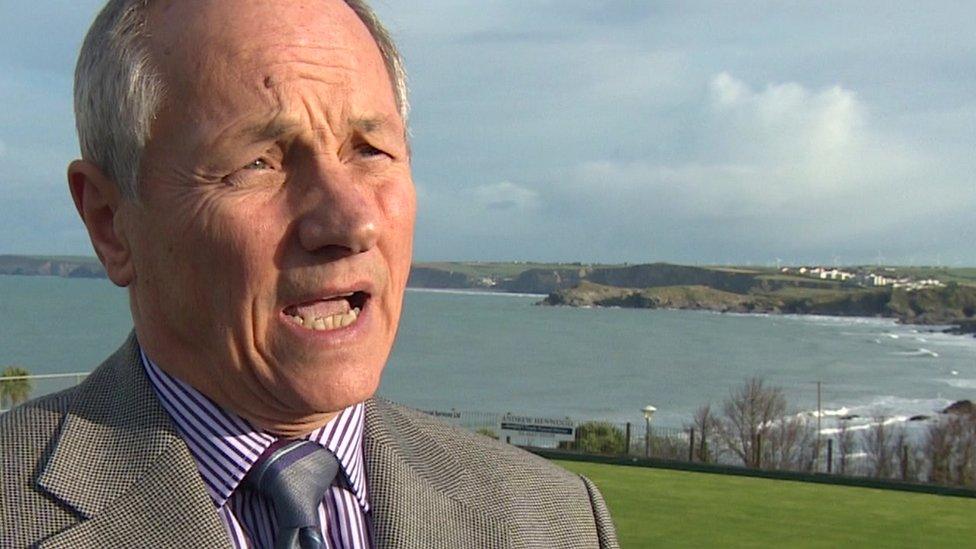Parish councils may face referendum cap over 'excessive' tax
- Published
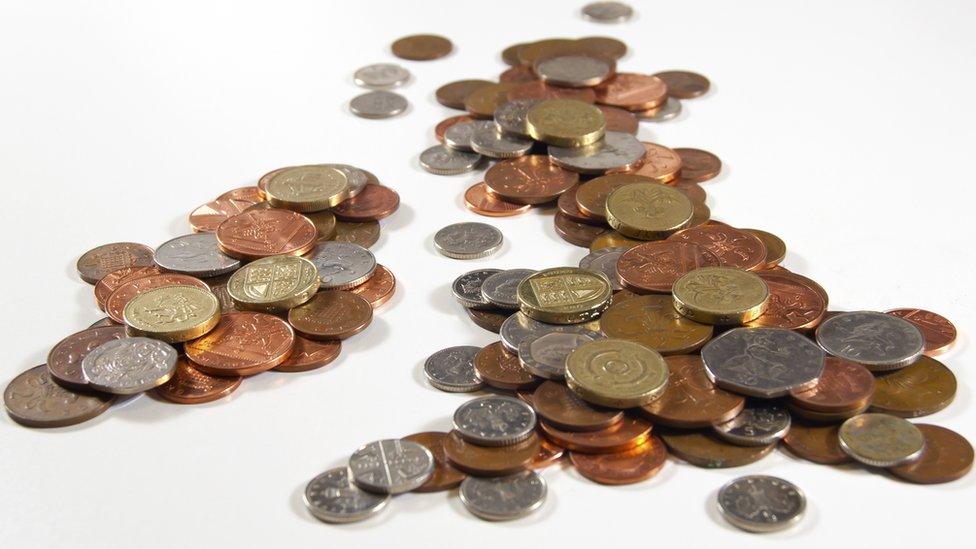
Parish councils can increase their bills more freely than other authorities
Parish councils wanting to raise council tax "excessively" may have to first consult the public in line with larger authorities, the government has warned.
Analysis by BBC News, external found thousands of parish and town councils in England increased their share of the annual bill, raising £18.9m in extra funds.
The government said it could make them "subject to the referendum principles".
But parish councils said that would be a threat to democracy.
Figures show 3,659 parish councils raised the basic Band D tax bill by more than 1.99%, the referendum threshold for larger councils.
Sixty small authorities at least doubled residents' bills last year.
Another 130 put their bills up by between 50 and 99% while 1,001 increased the annual bill for a Band D home by £5 or more.
Parish council tax rises
Small councils not subject to cap
£34.27
average annual share of a Band D council tax bill
1.99%
or £5 is the maximum others could increase without a referendum
-
5,217 parish and town councils increased the bill
-
3,659 increased the basic demand by above 1.99%
-
60 parish councils at least doubled their bills in 2015-16
-
3,535 councils froze or reduced their precept
Larger authorities and other bodies, such as police and crime commissioners, have to hold a referendum if they want a rise of 2% or more, or would raise bills by £5 per year per household. Parish councils are not subject to the same cap. This year, for larger councils, the threshold will be 3.99% as long as most of the increase funds adult care.
Some parish councils now planning large percentage increases for 2016-17, such as Sandbach Town Council in east Cheshire. It will raise its share of the council tax by 30%, about £18 a year for a Band D household.
A Department for Communities and Local Government (DCLG) spokesman said: "Town and parish councils should protect their taxpayers from excessive council tax increases; if they fail to do so, government has the option of making them subject to the referendum principles in future.
"This government is determined to keep council tax down with average council tax bills set to be less in real terms in 2020 than they were in 2010."
The spokesman would not say whether there was a percentage rise threshold in mind for parish councils.
'Bad for democracy'
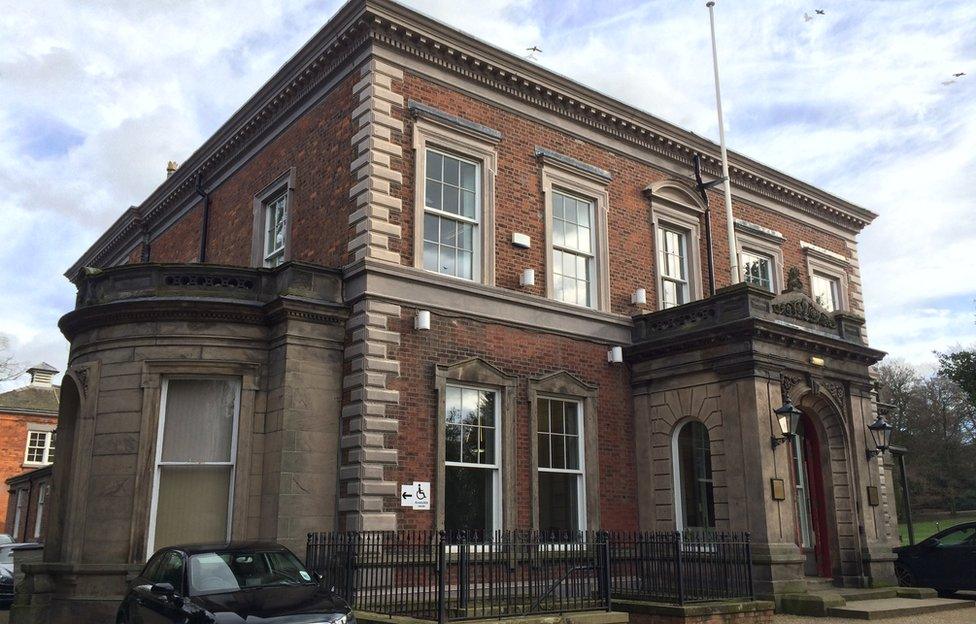
Frodsham Town Council's chairman says his authority would go bust if it had to hold a referendum
Defending the proposed rise, Sandbach Labour councillor Sam Corcoran said: "It's a large percentage increase but it's a small absolute increase. We've had our grant cut from Cheshire East Council, but more importantly we've got some exciting plans to redevelop the town centre, which will go out to consultation.
"If we decide not to go ahead, we will give the money back again."
One parish council chairman said the threat of a referendum would be bad for democracy.
Winchfield Parish Council in Hampshire, which has 260 homes, increased its council tax bills by £67.16 for Band D properties last year, raising them from £19.98 to £87.13. It was the largest rise in cash terms in England. The parish council's share is on top of a further £1,408 split between Hampshire County Council, the fire and rescue authority, police and crime commissioner and Hart District Council.
The council said it did so in order to fund planning consultants to help it challenge Hart District Council's plan for 5,000 new homes, external.
We've basically taken everything out of the piggy bank
Chairman and Conservative councillor Andrew Renshaw said: "Parish councils are the closest of all authorities to their community and are responsive to how their electors feel. If they feel we should be spending this sort of money, we should have the right to do so and it would be bad for democracy to take that right away."
Councillor Ken Browse, the chairman of the National Association of Local Councils, said parishes had increased their charges to pay for services, which had been withdrawn by larger authorities.
He said: "Local (parish and town) councils have been stepping up to the plate to take on a range of discretionary services which principal councils simply cannot afford to run any more - important local services and facilities such as libraries, toilets, youth work, community buildings and economic development activity.
"Add this to an already extensive range of visible services - like bus shelters, maintaining commons and open spaces, crime and community safety measures, running events and festivals, providing leisure and sports facilities - the average local council costs just £50 a year, less than a pound a week."
DCLG figures, external reveal out of 8,752 parish councils, external who had a share of council tax this year and last, 3,535 reduced or froze Band D bills.
Some parishes are also planning further rises from April, after taking on services previously run by district or county councils.
Newquay Town Council will put its council tax precept up 90%, adding £100 to a typical annual bill.
Frodsham Town Council in Cheshire is increasing its precept by 50%, equivalent to about £20 a year more for a Band D house.
Its chairman, Michael Pusey, said a referendum or a cap would put it out of business.
"We've basically taken everything out of the piggy bank, he said.
"If something went wrong, like a play area got vandalised, anything like that, we would not be able to do it. We need reserves to be able to do these things."

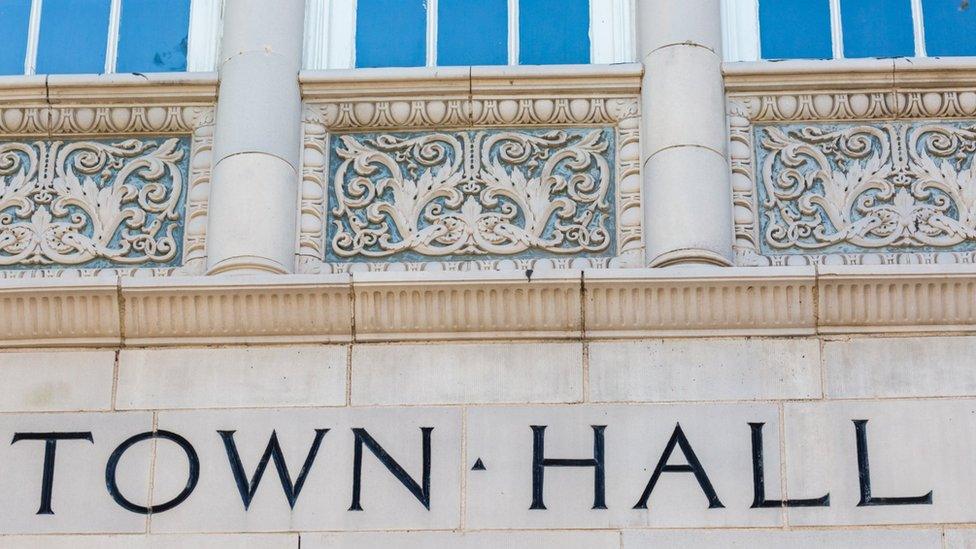
Analysis, Daniel Wainwright
Why do parish councils put up tax?
At first glance, the largest percentage rise in parish council tax precepts is an eye-watering one at almost 1,200%.
Thistleton in Rutland, which serves a community of 46 homes, actually asked for just £21.41 per Band D home, spread over the year.
It was a very large rise compared with the modest £1.65 residents were asked for in 2014-15.
The increase was imposed following a request to set up a "school bus escort".
The money paid for another adult, besides the driver, to be on the bus that passes through neighbouring villages, making sure the children were safe and well-behaved on their journey to school.
But it was not without controversy and the rise in the precept is being reduced again from April.
Helen Crisostomo, clerk of Thistleton Parish Council, said: "I gather the service was well-received but the decision went through without full attendance by parishioners and it's being reversed for the next year. The increase was a lot of money for older people who live alone."
Another large percentage increase was in Clarendon Park in Wiltshire, a parish of 250 people, where a 521% rise took the bill from £5.24 for a Band D home to £32.53.
However, parish clerk Dawn Jacobs said bills would reduce in the next financial year.
She said: "We requested a precept of £600 last year which went up to £3,600 this year.
"The reason for that was we needed to purchase new notice boards for the area and we also had a bus shelter that had been vandalised. They cost about £3,000 to replace. Our request for 2016-17 will be £200."

Referendum threshold
Under the Coalition government, councils and other local authorities were stopped from increasing council tax by 2% or more without first holding a referendum, but the rules do not apply to parish councils.
The first such referendum took place in May 2015 and was triggered when Bedfordshire Police and Crime Commissioner Olly Martins imposed a 15.8% increase in his force's share of council tax to pay for more officers. However, voters rejected the rise at the ballot box.
For the coming year, Chancellor George Osborne has raised the limit for a referendum to 3.99%, on condition that half the rise be used as a "social care precept" to fund adult care.
- Published17 May 2015
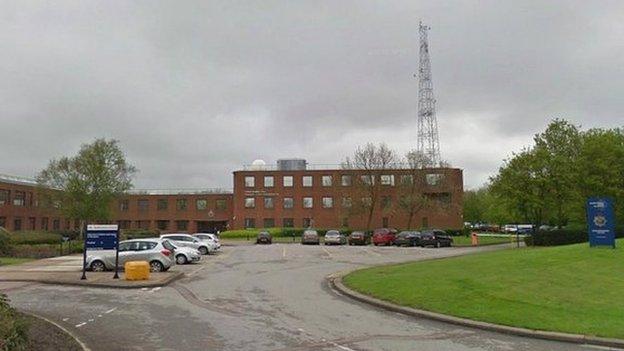
- Published15 January 2016
